Latest updates
24 October 2025 (upcoming)
The MIMIc team will present the results of the MIMIc project at the Belgian stakeholder event, organized at KU Leuven as part of the Leuven Child and Youth Institute seminar series. Participation is free, but you need to register at the following link.
18 July 2025
The findings from the MIMIc project have been featured in HORIZON: the EU Research & Innovation magazine. Read the full article at the following link. Video features: link1, link2
14 June 2025
At ICA, Dr. Luca Carbone received the Top Dissertation Award from the Children, Adolescents, and Media (CAM) division for their dissertation completed as part of the MIMIc project, titled “Mainstreaming Success: Neoliberal Success Narratives in Music and Their Internalization Among Adolescents.”
12 June 2025
Anaëlle Gonzalez presented a poster at the 2025 Social Sciences and Humanities Research Day on AI in and for Humanities and Social Sciences at KU Leuven. The poster showcased ongoing AI-related research at the Media Psychology Lab, featuring reflections building on the MIMIc results on influencers and morality, as well as Gaëlle Vanhoffelen’s work on Snapchat’s AI Chatbot, also developed within the MIMIc project.
12 – 16 June 2025
We participated at the annual meeting of the International Communication Association (ICA) in Denver. We presented the following studies of the MIMIc project:
- Edward Noon, Luca Carbone & Laura Vandenbosch. A Toxic Feedback Loop? The Relationship Between Performance-Contingent Self-Esteem and Toxic Communication in Adolescent Videogame Play
- Jasmina Rosič, Robyn Vanherle and Laura Vandenbosch. Daily Links Between Adolescents’ Perceived Digital Well-Being, State Self-Esteem, and Affective Well-Being.
- Thi Willems, Gaëlle Vanhoffelen, Chelly Maes and Laura Vandenbosch. An Intercultural Study on Adolescents’ Consensual and Non-Consensual Sexting Practices and Their Body Image and Sexuality.
- Gaëlle Vanhoffelen, Lara Schreurs and Laura Vandenbosch Goal-Oriented Online Self-Presentations: The Development and Validation of the GO-SP Scales and Their Links With Authenticity, Audience Size, and Platform Choices.
- Gaëlle Vanhoffelen, Laura Vandenbosch and Lara Schreurs. Teens, Tech, and Talk: Adolescents’ Use of and Emotional Reactions to Snapchat’s My AI Chatbot.
- Luca Carbone, Christoph Klimmt, & Laura Vandenbosch. The Internalization of a Performance-Oriented Self-Concept among Adolescents through their Favorite Music Artists
- Luca Carbone & Laura Vandenbosch. Unpacking the Internalization of Effort-Oriented Success Narratives through Adolescents’ Favorite Music Lyrics
- Chelly Maes, Robyn Vanherle, Jasmine Fardouly and Laura Vandenbosch. #BoPo, #Ideal, or #Mixed? Exploring Adolescents’ Daily Exposure to Appearance Content on Social Media and Its Relations With Body Image Components.
- Jasmina Rosič and Laura Vandenbosch. Adolescents’ Conversations in the Digital Era: The Role of Friends in Co-Present Smartphone Use Competence.
- Lara Schreurs, Ines Boeckxstaens, Angela Y. Lee, Toon Tabruyn, Sunny X. Liu, Katie Fitzgerald, Jeff Hancock & Laura Vandenbosch. Who Is Posting What on Social Media? Insights From Adolescents’ Data Donations in Three European Countries
- Femke Konings, Laura Vandenbosch, Katie Fitzgerald, Jasmine Fardouly, Elien Beelen, Toon Tabruyn, Kathrin Karsay and Chelly Maes. Adolescents’ Sexualized Self-Presentations on Social Media: A Cross-National Data Donation Study.
- Luca Carbone, Laura Vandenbosch, Christoph Klimmt, & Julian Schaap. A Theory of Resonant Experiences with Media.
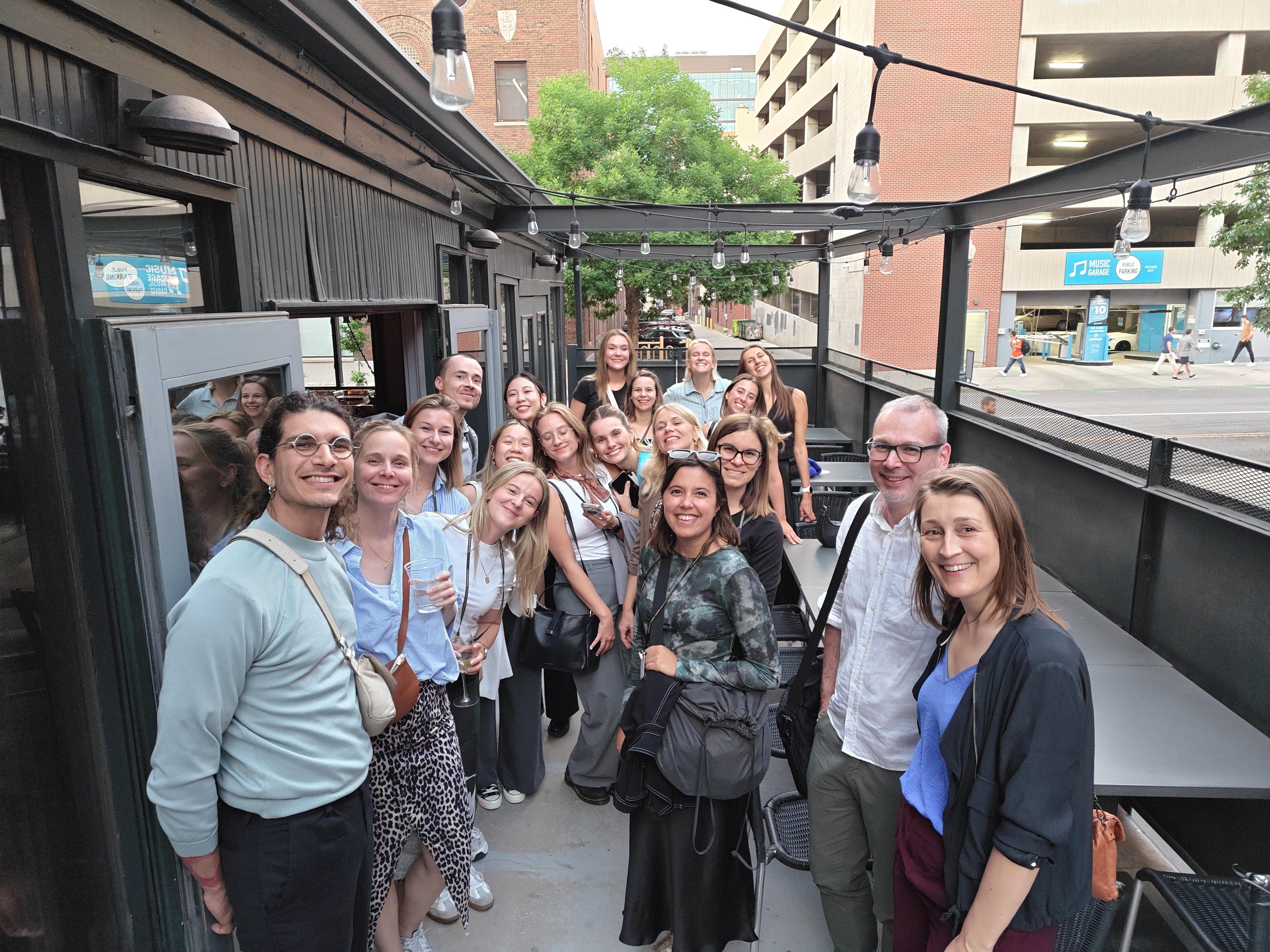
20 May 2025
Laura Vandenbosch participated at the MediaNest Study Day where new findings from the research MediaNest on media-parenting practices in Flanders were presented.
15 May 2025
Gaëlle Vanhoffelen gave a workshop on youth social media use, based on the findings of the MIMIc project, to a broad audience of parents, caregivers, teachers, and media professionals during the City of Genk’s study day “Online Polarization & Connection 2.0.”
15 May 2025
Anaëlle Gonzalez, Isra Irmak Akgün, and Laura Vandenbosch published an article titled “The Values of Fame: Exploring the Visual and Textual Representations of Basic Values in Influencers’ Instagram Content” in the journal Social Media + Society. The article is available at the following link.
13 May 2025
Gaëlle Vanhoffelen, Anaëlle Gonzalez, Lara Schreurs, Caroline Giraudeau, and Laura Vandenbosch published an article titled “The Perfect Li(f)e: A Longitudinal Study on Positive Social Media Content and European Adolescents’ Perfectionism.” in the journal Communication Research. The article is available at the following link.
13 May 2025
Femke Konings, Laura Vandenbosch, Kaitlin Fitzgerald, Jasmine Fardouly, Elien Beleen, Toon Tabruyn, Kathrin Karsay, and Chelly Maes published an article titled “Adolescents’ sexualized self-presentations on social media: A cross-national data donation study” in the journal Media Psychology. The article is available at the following link.
13 May 2025
Anaëlle Gonzalez was appointed as a Social Media Editor for the Journal of Children and Media.
13 April 2025
The MIMIc project was presented as part of the EU Pavilion exhibition at EXPO 2025 in Osaka, Japan.
12–13 April 2025
The following studies related to morality from the MIMIc longitudinal and data donation studies at the Moral Media Conference in Buffalo, United States. • Anaëlle Gonzalez, Lindsay Hahn & Laura Vandenbosch. The Moral Influence of Adolescents’ Favorite Influencers and TV Characters: A Three-Wave Panel Study of Media, Selection, and Reciprocal Effects. • Kaitlin Fitzgerald, Anaëlle Gonzalez, Kristina Rakinić, Bojana Lobe, & Laura Vandenbosch. Moral Foundations in Adolescents’ Social Media Posts: Insights from a Cross-National Data Donation Study.
10 April 2025
Jasmina Rosič, Lara Schreurs, & Laura Vandenbosch published an article titled “Adolescents’ perceptions regarding their smartphone use: Longitudinal relationships between perceived digital well-being and self-esteem” in the journal Journal of Computer-Mediated Communication. The article is available at the following link.
3 April 2025
The results of the MIMIc project were shared on the ERC website. Find more information at the following link.
25 March 2025
Following the screening of Can’t Feel Nothing (2024), directed by David Borenstein, at DOCVILLE, the international documentary film festival held at Cinema ZED in Leuven, Luca Carbone was invited to discuss youth mental health and social media use .
13 March 2025
Gaëlle Vanhoffelen presented findings from the MIMIc project on adolescents’ self-presentation on social media at Research Day, organized by the Faculty of Social Sciences (KU Leuven).
26 February 2025
Laura Vandenbosch attended the meeting with representatives of the Flemish Government’s Minister of Well-Being to advise, together with other Flemish researchers, on measures to tackle social media use among youngsters.
22 February 2025
Anaëlle Gonzalez and Jasmina Rosič, together with Prof. Dr. Esther Martínez Pastor and Prof. Dr. Marian Blanco-Ruiz Rey from Juan Carlos University (Spain), are guest editors of the special issue of Doxa Comunicación entitled “Digital Environments and Mental Health in Young People: Challenges and Opportunities.” You are kindly invited to submit your paper there until 30/06/2025. More information via this link
21 February 2025
Gaëlle Vanhoffelen participated in media.forum 2025, the second symposium organized by the knowledge center Mediapunt in partnership with the Department of Culture, Youth, and Media of the Flemish Government. Insights from the media.monitor 2025 were shared. Afterwards, participants formulated relevant policy recommendations that contribute to a stronger and more resilient media landscape in Flanders, in the presence of Minister Van Achter.
21 February 2025
Since May 30, 2024, Laura Vandenbosch and Jasmina Rosič have been participating with a selected group of ERC grantees in a pilot project on data access for research under the Digital Services Act (DSA) to help prepare an application for access to non-public data from platforms to conduct research on “systemic risks” in the EU. The pilot is under the coordination of the European Commission’s Directorate-General for Communications Networks, Content and Technology (DG CNECT) and the European Research Council (ERC) with the support of the Joint Research Centre - European Centre for Algorithmic Transparency (JRC-ECAT).
15 – 16 February 2025
The MIMIc team participated at KU Leuven Inside—the opening weekend celebrating 600 years of KU Leuven. Together with colleagues from the Media Psychology lab, we showcased project MIMIc findings on the effects of digital media use through an interactive smartphone use exhibition. Additionally, Laura Vandenbosch delivered a 600-second lecture targeted at children explaining whether social media is a curse or a blessing. Available via this link (in Dutch).
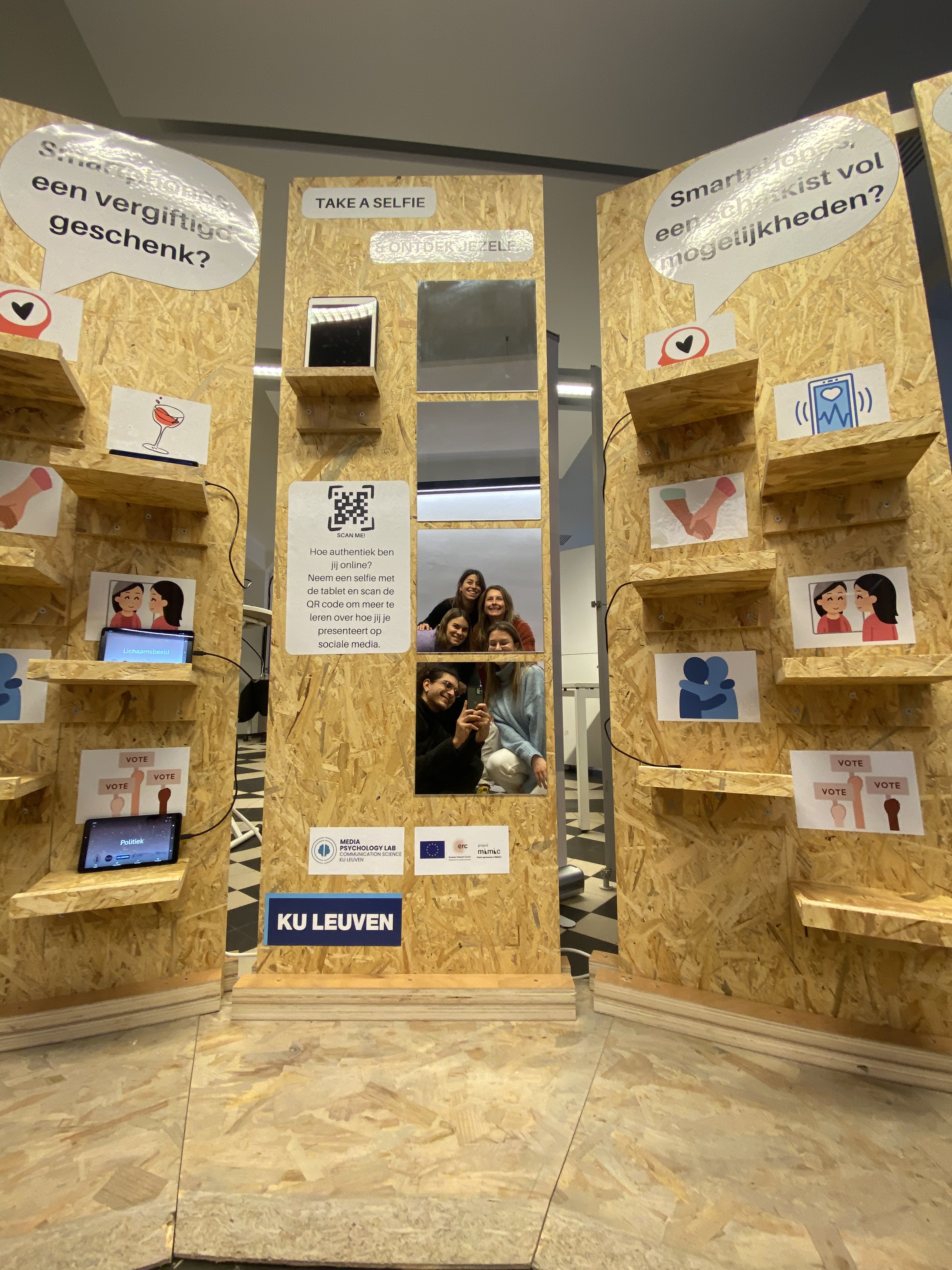
11 February 2025
Laura Vandenbosch participated at the Safer Internet Day on the topic of AI use among children and youth, where she shed a light on how youth experience AI and how can we teach adolescents to consciously deal with the risks that chatbots, deepfakes, and deepnudes ( link).
5 - 6 February 2025
Luca Carbone and Jasmina Rosič attended the Leuven Child and Youth Institute conference, where Laura Vandenbosch presented and discussed the project MIMIc findings on how online spaces influence users’ body image.
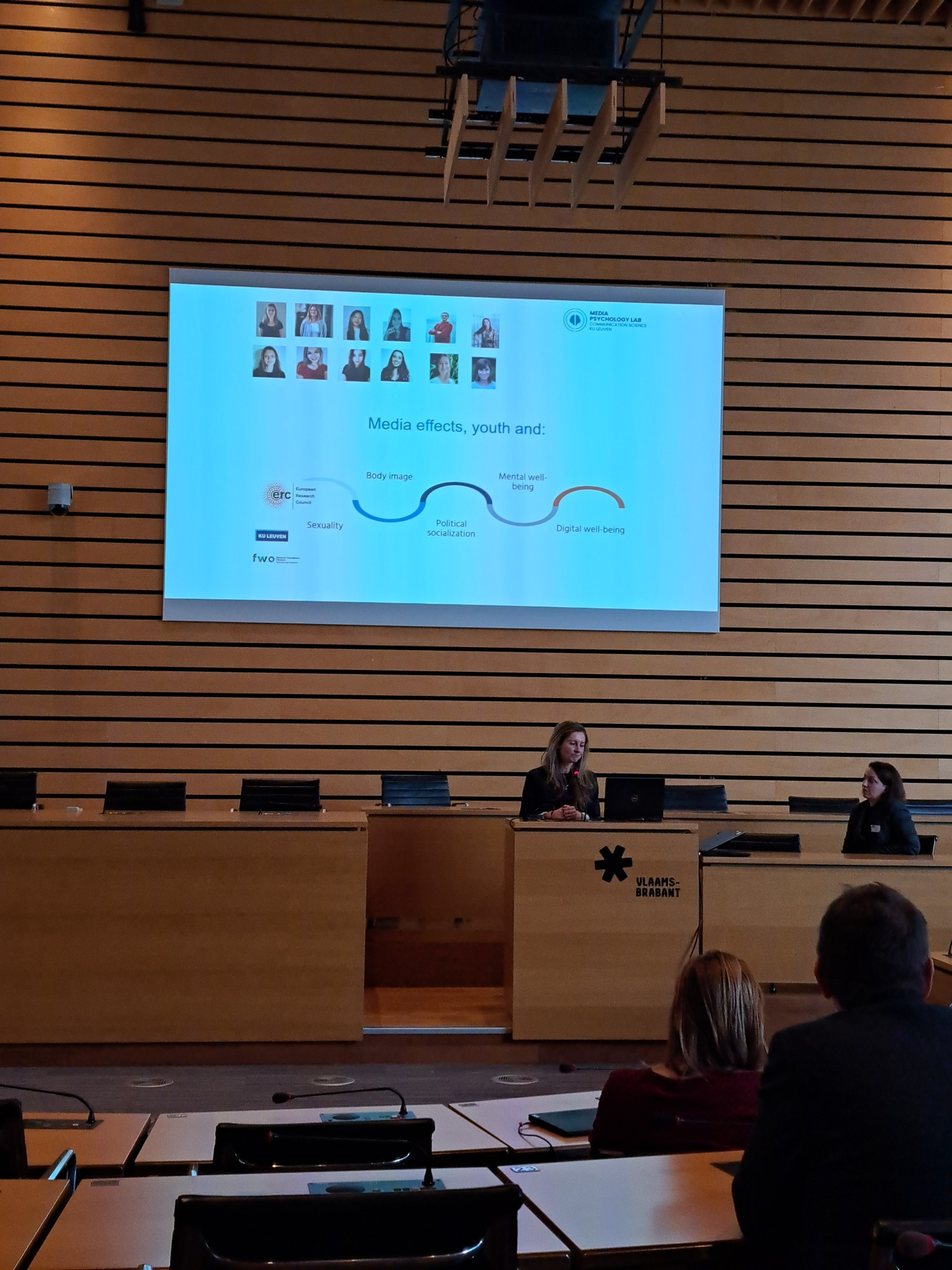
3 – 4 February 2025
We participated at the Etmaal van de Communicatiewetenschap 2025 conference in Brugges, which we co-organized with our colleagues from the Communication Science department. We presented these studies of the MIMIc project:
- Luca Carbone, Laura Vandenbosch, Christoph Klimmt, & Julian Schaap. A Theory of Resonant Experiences with Media.
- Anaëlle Gonzalez & Laura Vandenbosch. Politically-Influenced by Non-Political Actors? Longitudinal Reciprocal Associations Between Famous Figures’ Political Social Media Posts and Political Interest in Adolescence.
- Jasmina Rosič, Robyn Vanherle, & Laura Vandenbosch. Disentangling Daily Relationships Between Adolescents’ Perceived Digital Well-Being, State Self-Esteem, and Affective Well-being.
- Gaëlle Vanhoffelen, Lara Schreurs, & Laura Vandenbosch. Very Demure, Very Authentic? Disentangling the Longitudinal Links between Authentic and Inauthentic Online Self-Presentations and Adolescents’ Identity Distress in Social Media Contexts.
- Thi Willems, Gaëlle Vanhoffelen, Chelly Maes, and Laura Vandenbosch. An Intercultural Study on Adolescents’ Consensual and Non-Consensual Sexting Practices and Their Body Image and Sexuality
07 January 2025
Laura Vandenbosch, Kathleen Beullens, Robyn Vanherle, and Lara Schreurs published an article titled “Digital media uses and effects: The contributing roles of time” in the journal Journal of Children and Media. The article is available at the following link.
29 November 2024
Laura Vandenbosch gave a keynote speech at the Cyberspace Conference organized by Masaryk University in Brno. She presented the latest trends in research about the relationship between social media use and body image that can help empower youth in building resilience and combating algorithm-driven appearance pressures ( link).
October-November 2024
Anaëlle Gonzalez was on a research stay at the University at Buffalo, New York. For a month, she visiting Dr. Lindsay Hahn, an Assistant Professor in the Department of Communication and Center for Cognitive Science. Dr. Hahn directs the Media Psychology and Morality Lab, where her research focuses on morally-laden media and its effects. Together, they collaborated on a paper as part of the ERC MIMIc project. This research investigates the longitudinal relationships between the moral values of adolescents’ favorite influencers and celebrities on social media and the adolescents’ own moral values, offering new insights into the study of youth, morality, and social media. Besides this, Anaëlle was also invited to give a departmental seminar to share the results of the MIMIc project.
18 October 2024
Prof. Laura Vandenbosch presented results from the MIMIc project at the event “Lichaamsbeeld in de tijd van likes” as part of the Child and Youth Institute seminar series.
30 September 2024
We are thrilled to announce that Stanford University recognized Prof. Laura Vandenbosch as one of the world’s top 2% scientists. The Stanford University list ranks scientists based on bibliometric data, including citation counts and h-index. These metrics reflect the influence and reach of a scientist’s research contributions. Prof. Vandenbosch was ranked 403rd out of 14,032 in the Communication & Media Studies. This acknowledgment highlights her important research contributions with an h-index of 36 and over 5000 citations. Prof. Vandenbosch emphasizes that this recognition is not only an individual success but a result of the collaborative efforts with the (PhD) researchers with whom she works. For more details: link
24 – 27 September 2024
Jasmina Rosič, Anaëlle Gonzalez, and Gaëlle Vanhoffelen presented their most recent work within the MIMIc project at the 10th European Communication Research and Education Association (ECREA) conference in Ljubljana (Slovenia).
24 September 2024
The Project MIMIc closing event for schools and various relevant stakeholders took place in Ljubljana (Slovenia). The representatives of the schools, National Institute of Public Health, University of Ljubljana (Faculty of Social Sciences, Faculty of Education, Faculty of Arts), Ombudsperson, Ministry of Education, Ministry of Digital Transformation, and NGO LOGOUT participated in the event. Jasmina Rosič and Laura Vandenbosch, together with Kristina Rakinić shared some insights from the MIMIc project, policy and research recommendations, and a tool to promote adolescents’ digital literacy (i.e., Vibe check). The findings were discussed with a local researcher and practitioner in the digital literacy field (i.e., Safe.si and LOGOUT).
16 September 2024
Luca Carbone has successfully defended their PhD titled “MainStreaming Success. Neoliberal Success Narratives in Music and their Internalization among Adolescents”. You can find a copy of Luca’s PhD dissertation at the following link.
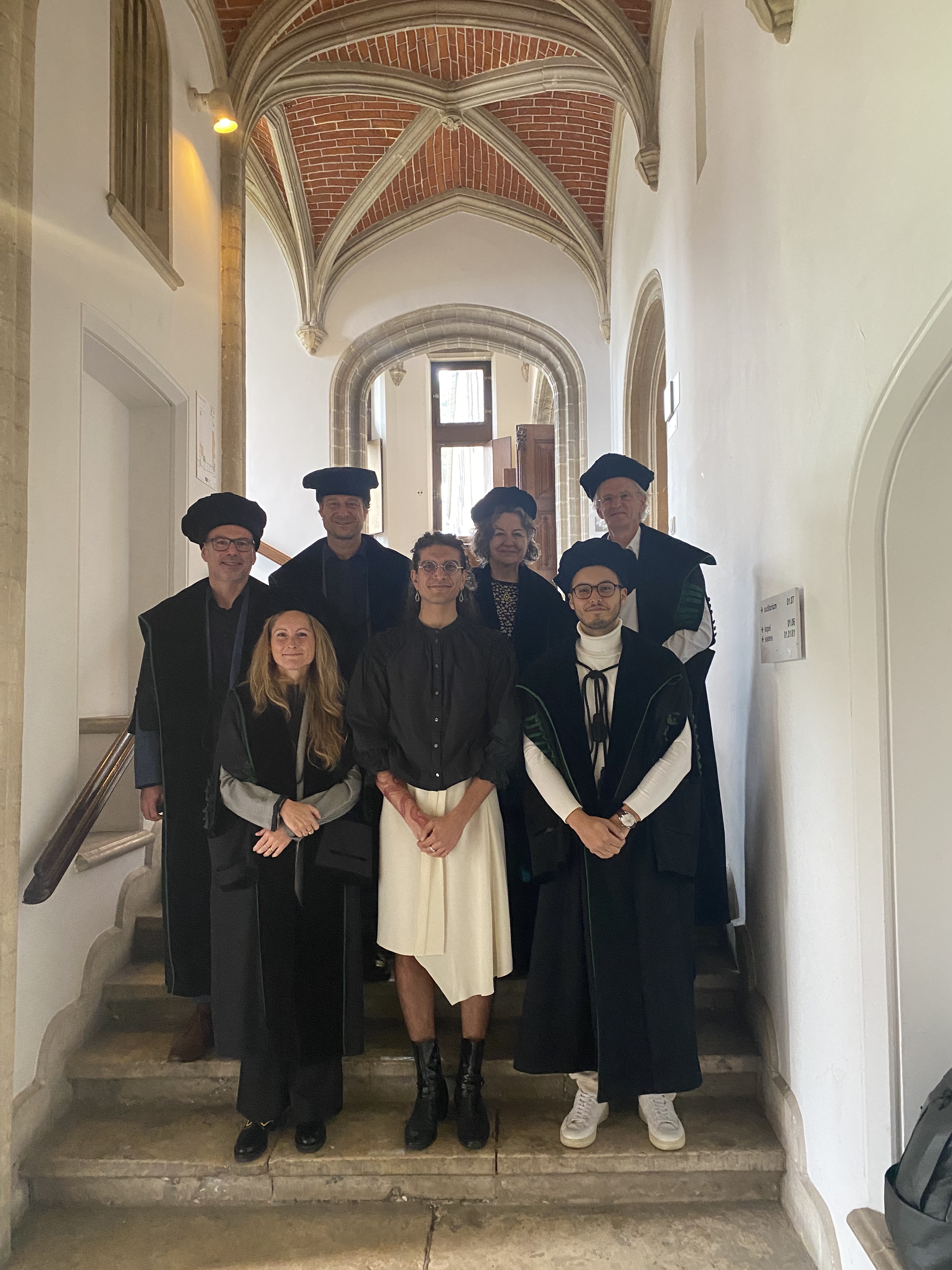
17 August 2024
Gaëlle Vanhoffelen gave an invited lecture on the links between social media use and adolescents’ mental health, based on the MIMIc data, at the No Babes’ social media event in Ghent. link
4 - 11 August 2024
Jasmina Rosič participated in the European media and communication doctoral summer school (ECREA) in Roskilde (Denmark). She shared the results of the MIMIc project, gained valuable insights from scholarly peer-review, and participated in workshops that were important for further investigation within the project.
1 August 2024
Katie Fitzgerald, Toon Tabruyn, and Laura Vandenbosch published an article titled “Adolescent Emotional Expression on Social Media: A Data Donation Study Across Three European Countries” in the journal Affective Science. The article is available at the following link.
1 July 2024
Prof. Laura Vandenbosch was invited to give a lecture roundtable at the EC program to talk about the influence of social media on mental health (organized by European Council).
20-21 June 2024
During the European Communication Science Event (ECSE) that took place in Nijmegen (Netherlands) on 20-21st of June 2024, Anaëlle Gonzalez coordinated a panel session on influencer research across communication sub-disciplines. During this panel, she presented some follow-up findings on the political content of influencers (co-authored with Phoebe Kwan and Laura Vandenbosch) and the frames that they use when talking about politics on social media.
13 June 2024
Jasmina Rosič presented the MIMIc Project and her study on digital flourishing in adolescence in a pitch session at the General Assembly of the KU Leuven Digital Society Institute (DigiSoc).
1 June 2024
Prof. Laura Vandenbosch was invited to give a lecture titled “Apestaartjaren & Génération 2024” at the Federal Event “Online relaties” (Brussels).
27 May 2024
Luca Carbone, Priscila Alvarez-Cueva, and Laura Vandenbosch published an article titled “Status Markers in Popular Music Across Six Countries: A Content Analysis of Gender, Race/Ethnicity, Genre, and Capital in Music Lyrics” in the journal Sex Roles. The article is available at the following link.
16 May 2024
Prof. Laura Vandenbosch was invited to give a lecture titled “Apestaartjaren: Digital Balance” at Mediawijs (Mechelen).
14 May 2024
Prof. Laura Vandenbosch was part of the documentary “Chasing Beauty” where she offered her expertise on the role of social media on beauty ideals. Find more information at this link.
7 May 2024
Luca Carbone presented results of the MIMIc project at the invited talk “KU Leuven x AB Talk” to discuss the impact of social media on popular culture and the contemporary music industry. The talk can be seen at the following link.
18 April 2024
Prof. Laura Vandenbosch was invited to give a lecture titled “Sociale media vloek of zegen?” at the Postuniversitair centrum KU Leuven (Kortrijk)
13 April 2024
Jasmina Rosič and Laura Vandenbosch published an article titled “Trajectories of digital flourishing in adolescence: The predictive roles of developmental changes and digital divide factors”. The article is available at the following link.
09 April 2024
Edward Noon, Luca Carbone, and Laura Vandenbosch published an article titled “Adolescents’ videogame play, need satisfaction, and self-esteem: a self-determination perspective” in the journal Current Psychology. The article is available at the following link.
03 April 2024
MIMIc team member Luca Carbone presented results from the research conducted within the MIMIc project as part of the invited lecture titled “Long-term music effects among adolescents”. This event was part of the event “CII Spotlight” organized by the Cluster on Inequalities and Inclusion at the Weatherhead Center (Harvard University).
26 March 2024
MIMIc team member Luca Carbone presented results from the research conducted within the MIMIc project as part of the invited lecture titled “Meritocracy and Inequality”. This event was part of the event “Harvard Culture and Social Analysis Workshop” organized by the Sociology Department at Harvard University.
19 March 2024
MIMIc team member Gaëlle Vanhoffelen presented results regarding adolescents’ social media use from the research conducted within the MIMIc project as part of the invited lecture titled “Sociale media: een vloek of een zegen?”. This event was part of the “A1000” project organized by Het Paleis with the aim of informing Antwerp youth (16 to 18 years old) about today’s societal challenges to prepare them for the upcoming elections.
14 March 2024
Luca Carbone and Laura Vandenbosch published an article titled “Adolescents’ music tastes in the streaming era: The case of Belgium” in the journal Cultural Sociology. The article is available at the following link.
14 March 2024
Anaëlle Gonzalez and Laura Vandenbosch published an article titled “A Systematic Content Analysis of the Moral Foundations Featured in Celebrities’, Influencers’, and Athletes’ Instagram Content”. The article is available at the following link: https://doi.org/10.1080/15205436.2024.2317764
07 March 2024
Mimic members Laura Vandenbosch, Jasmina Rosič and Anaëlle Gonzalez met with the current ERCEA Scientific officer for Social Sciences and Humanities. During the meeting, they presented the progress of the MIMIc project and its societal relevance, and discussed some challenges inherent to big ERC projects.
20 February 2024
MIMIc team member Luca Carbone presented results from the research conducted within the MIMIc project as part of the invited lecture titled “Measurement strategies across media objects and individuals’ cognitions”. This event was part of the “Graduate Seminar on Quantitative Methods in Sociology” organized by the Sociology Department at Boston University.
08-09 February 2024
MIMIc members Jasmina Rosič, Gaëlle Vanhoffelen and Anaëlle Gonzalez presented new results from the MIMIc project at the Etmaal van de Communicatiewetenschap conference in Rotterdam (Netherlands) in February 2024. Those same papers will be presented in September 2024 at the European Communication Research and Education Association (ECREA) conference in Ljubljana (Slovenia). Below you can read the titles and abstracts of the works they presented/will present:
Jasmina Rosič
- Authors: Jasmina Rosič, Lara Schreurs, Sophie H. Janicke-Bowles, and Laura Vandenbosch
- Title: Digital flourishing in adolescence: A one-year trajectory study
- Abstract: Digital flourishing refers to the positive perceptions of digital communication use in five dimensions: connectedness, positive social comparison, authentic self-presentation, civil participation, and self-control. This three-wave panel study among 1,081 Slovenian adolescents (Mage = 15.34 years, 53.8% boys, 80.7% ethnic majority) explored the trajectories of their digital flourishing dimensions over one year (2021–2022). Latent class growth analysis identified two classes. Adolescents in the first class reported high levels of digital flourishing, which remained stable over time, whereas those in the second class reported low levels of digital flourishing with decreased self-control over time. Autonomy-supportive restrictive, autonomy-supportive active, and controlling active parental mediation styles, together with high parental digital skills, predicted adolescents’ belongingness to the (more digitally flourishing) first class.
Gaëlle Vanhoffelen
- Authors: Gaëlle Vanhoffelen, Anaëlle Gonzalez, Lara Schreurs, Caroline Giraudeau, and Laura Vandenbosch
- Title: The Perfect Li(f)e: a Longitudinal Study on Positive Social Media Content and European Adolescents’ Perfectionism
- Abstract: Youth perfectionism levels have increased significantly over the last decades. Given the dominance of picture-perfect content online, social media are often pointed out as contributors of this rise. Accordingly, the current study examined how exposure to positive social media content might increase adolescents’ perfectionistic traits and vice versa. Moreover, it was explored whether upward social comparison and adolescents’ sociocultural context (on a micro and macro level) play, respectively, a mediating and moderating role in this model. A three-wave panel study was conducted among an analytical sample of 1697 Belgian, French, and Slovenian adolescents (Mage=15.14, SDage=1.78, 53.6% girls). The between-person results showed that higher trait-like levels of exposure to positive social media content (appearance- and life-related) is significantly related to higher trait-like levels of perfectionism (self-oriented and socially prescribed). Moreover, adolescents’ trait-level of upward social comparison was found to act as an explaining mechanism in the link with socially prescribed perfectionism. However, a more complex pattern emerged at the within-person level with different results across waves, countries, and adolescents’ individualistic values.
Anaëlle Gonzalez
- Authors: Anaëlle Gonzalez and Laura Vandenbosch
- Title: Adolescents’ Political Empowerment on Social Media: Exploring the Relationships between Role Models’ Political Content and Political Self-Efficacy
- Abstract: Adolescents’ favorite role models (i.e., influencers, celebrities and sports stars) have been documented to share political opinions on their social media accounts amid their entertainment and lifestyle content. Through engaging political posts, these actors have the potential to empower the political self-efficacy skills of their (young) audiences. The link between the promotion of political content by social media role models and adolescents’ political self-efficacy may further depend on the type of role model (comparing influencers, celebrities, and sports stars), parasocial interactions between the role model and the user, the level of political interest of the user, and the level of elaborate and selective processing of political information on social media of the user. Yet knowledge is lacking on these potential boundary conditions. We used (cross-sectional) data collected among 415 French adolescents aged 11-19 in 2022. The findings showed that a higher prevalence of political content in role models’ social media was associated with higher levels of political self-efficacy among adolescents. None of the explored conditions moderated the relationship of interest. Theoretical and practical implications are discussed.
7 December 2023
End of the diary study and information regarding the vouchers for the participants
The MIMIc team is excited to announce the successful completion of the Daily Diary Study (study 3), marking the conclusion of data collection for the MIMIc project. Every evening from November 6th to November 21st, the adolescents participating in the project across France, Slovenia, and Belgium shared insights into their daily media habits and well-being. The average daily participation rates are 110 participants per day in France, 260 in Slovenia, and 230 in Belgium.
Participants were rewarded with gift vouchers. Detailed information about the voucher distribution, such as how we calculated the days and corresponding rewards, can be found below:
- The value of the voucher depends on the number of days the participants participated in the study:

-
As stated in our communication to the participants, for daily participation to count as valid, the surveys had to be completed in the evening before they went to bed and after they finished using social media, series/movies, or music. If participants completed the survey before 7 pm or after 3 am, the questionnaire was counted as invalid.
-
Because we encountered multiple technical issues during the first two or three days, all participants were automatically assigned these two days (the questionnaires of November 6th and 7th for France and Slovenia / the questionnaires of November 7th and 8th for Belgium were counted as valid for everyone, including those who did not fill it, or those who filled it at the wrong time).
-
In addition, because of the encountered issues, the study ran over 16 days instead of 14 days. This means the participants had two additional chances to reach 14 days to obtain the highest voucher.
-
If the participants immediately emailed us to inform us that they had a specific technical issue one day (i.e., app freezing or not loading, questionnaire not present on the app even after past their bed time), and depending on the issue reported, the participants’ day was counted as valid.
-
Please note that not receiving a notification on the smartphone was not a valid issue to be automatically attributed to the voucher/day. The participants were informed to check their phones in the evening, potentially setting an alarm. No notifications were promised, and their absence can also be due to participants’ specific settings (i.e., phone in silence mode or turned off, etc.).
-
After all these factors were accounted for, we counted how many days each participant had completed the questionnaire correctly and the corresponding value of their voucher. They were then informed by email about this score. Finally, the MIMIc team is grateful for the dedication and enthusiasm of the participants in participating in our study and would like to thank them again. We look forward to analyzing the collected data and informing the participants of the results.
We already wish everyone happy winter holidays!
2023
Prof. Laura Vandenbosch was awarded the Vlaamse Wetenschappelijke Stichting (VWS) price for her research into growing up in a digital media world link.
1 December 2023
MIMIc members Jasmina Rosič and Laura Vandenbosch published an article titled “Measuring digital well-being in everyday life among Slovenian adolescents: The Perceived Digital Well-Being in Adolescence Scale”. The article is available at the following link.
7 October 2023
Assoc. Prof. Laura Vandenbosch presented results from the research conducted within the MIMIc project as part of the invited lecture titled “Picture Perfect: Hoe Instagram, Netflix en muziek de identiteit van tieners vormen”. This event was part of the yearly “Child University Day at KU Leuven”. More information about the event can be found at this link.
6 October 2023
MIMIc team member Luca Carbone presented results from the research conducted within the MIMIc project as part of the invited lecture titled “Spotify killed the video stars? Individualization processes in contemporary mainstream music”. This event was part of the event “Pop Talks” organized by the International Association for the Study of Popular Music (IASPM).
24 September 2023
Assoc. Prof. Laura Vandenbosch presented results from the research conducted within the MIMIc project at the NEFCA Media Psychology event “Day of the Media Psychology: Discussing challenges and opportunities in an evolving media landscape”.
24 August 2023
Assoc. Prof. Laura Vandenbosch presented results from the research conducted within the MIMIc project as part of her invited lecture “Digital Media Uses and Adolescents’ Development”. This event was part of the event “ENIGMA” organized with school teachers by KU Leuven.
21 April 2023
The MIMIc Team has presented the project and its components to the KU Leuven Faculty of Social Sciences at the Research Day. We present below the poster that was used for this day, as well as a happy picture of the team!
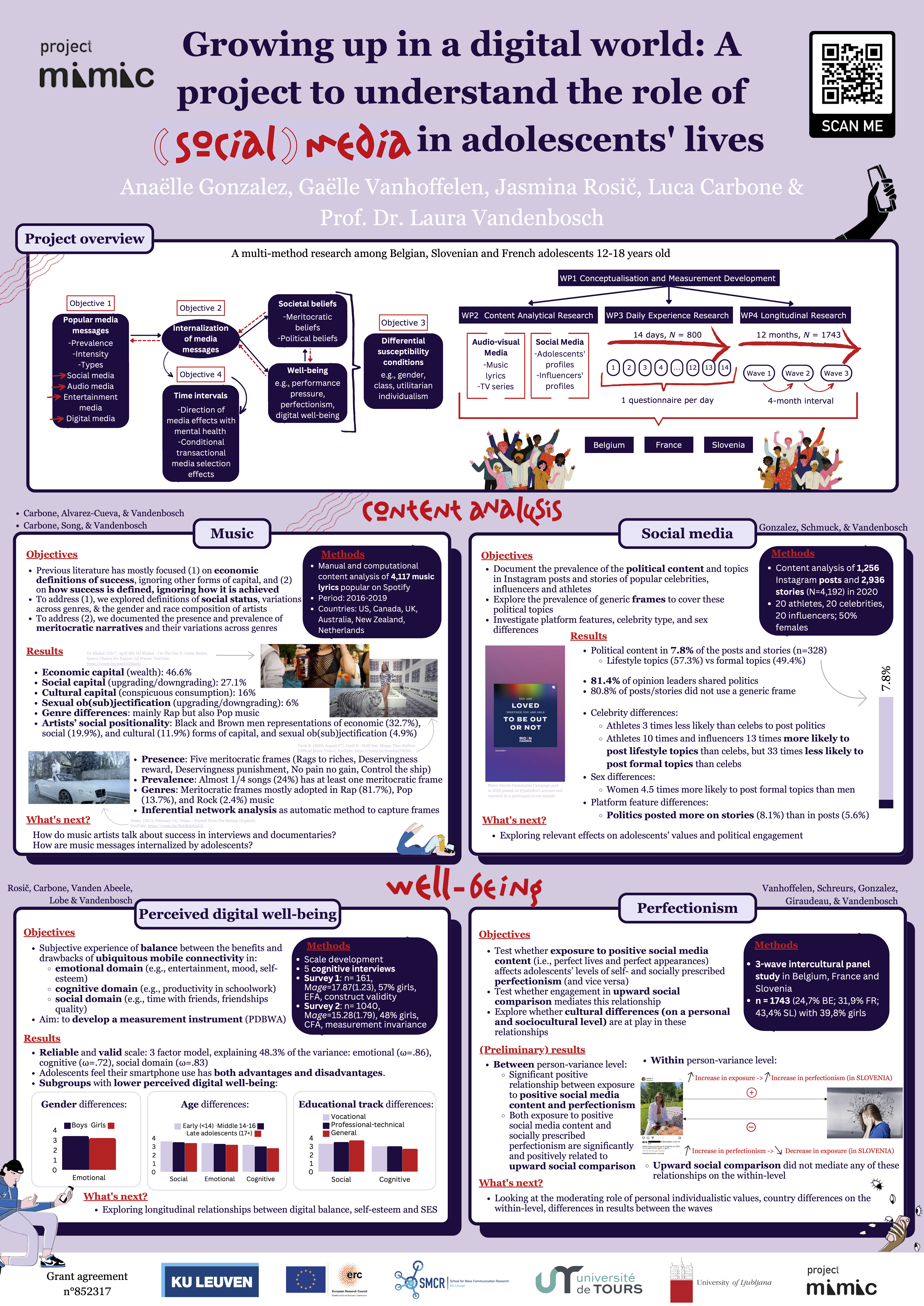
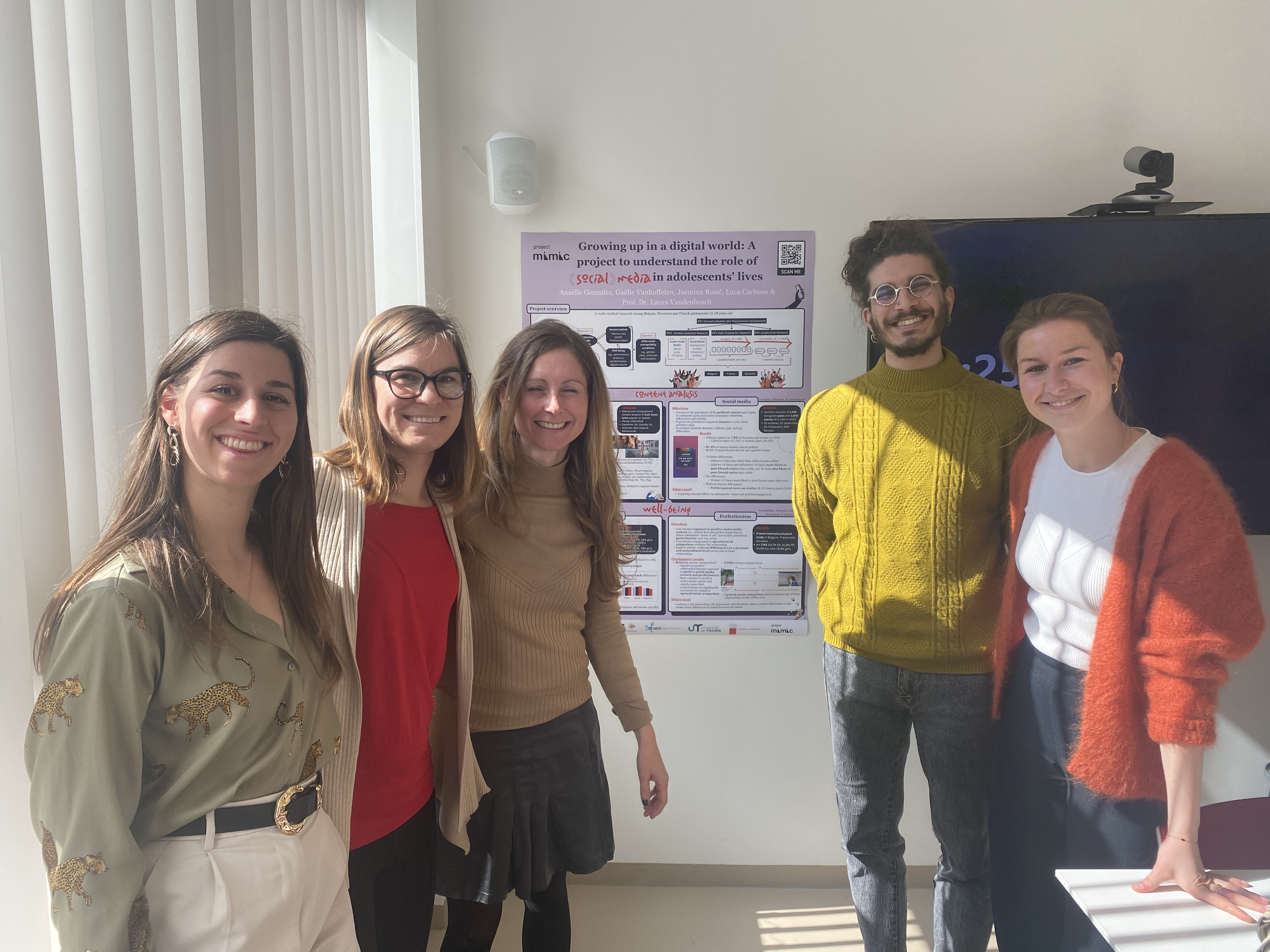
19 April 2023
MIMIc members Luca Carbone and Laura Vandenbosch published an article titled “A Meta-Analysis of Studies Examining the Effect of Music on Beliefs”. The article is available at the following link.
27 February 2023
MIMIc team member Jasmina Rosič presented some results of the MIMIc project in the invited lecture at the Chapman University (USA) titled “Digital flourishing in adolescence.”
13 February 2023
MIMIc team member Jasmina Rosič presented some results of the MIMIc project in the invited lecture at the Chapman University (USA) titled “The perceived digital balance in adolescence.”
25 January 2023
MIMIc members, Anaëlle Gonzalez, Gaëlle Vanhoffelen, Jasmina Rosič, and Luca Carbone, will soon present new results from the MIMIc project at two conferences, the Etmaal van de Communicatiewetenschap (February 2023) and the 73nd International Communication Association (ICA) (May 2023). Below, you can read the titles and abstracts of the works they will present.
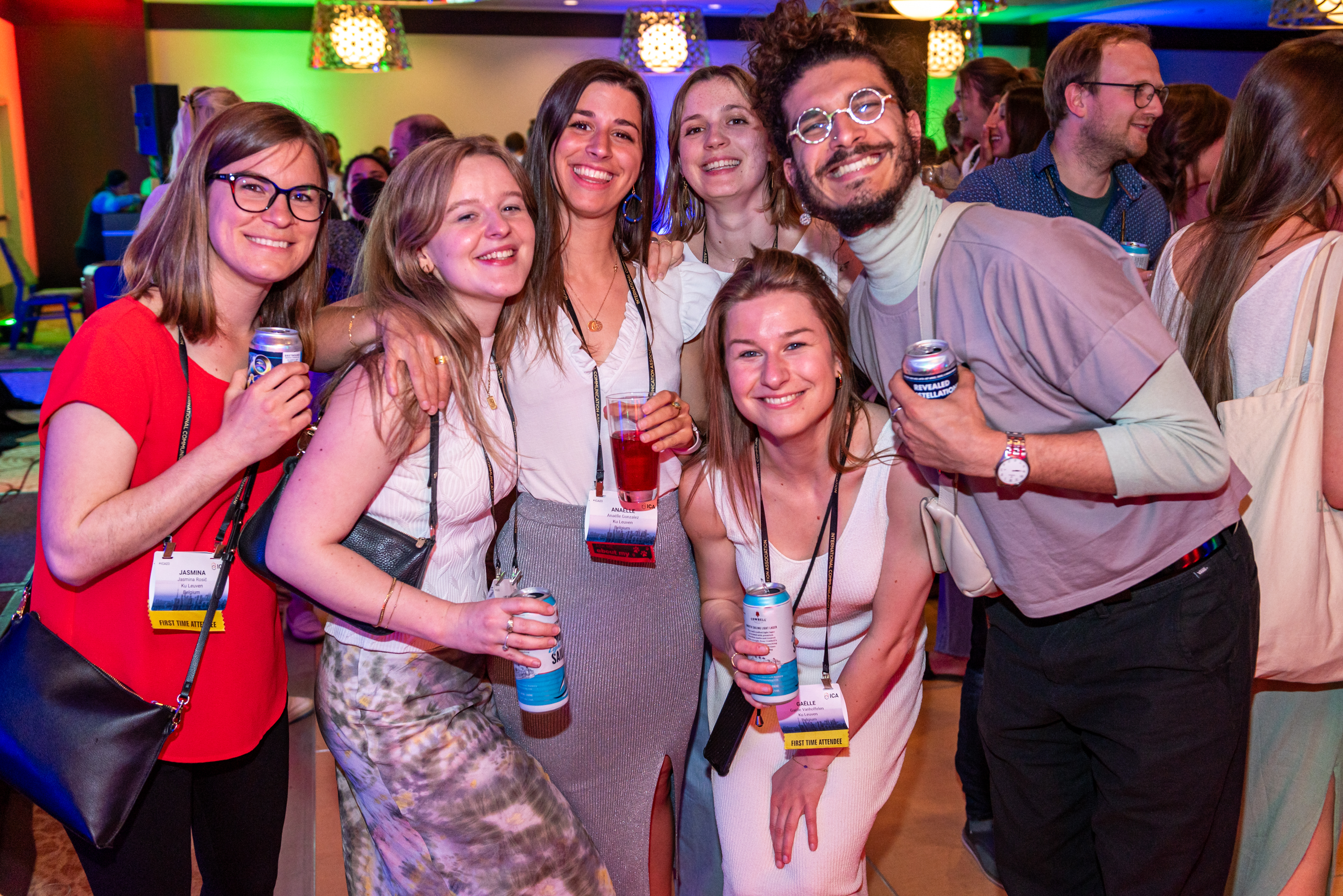
Anaëlle Gonzalez
ICA 2023 presentation
- Authors: Anaëlle Gonzalez, Desiree Schmuck, and Laura Vandenbosch
- Title: Posting and Framing Politics: A Content Analysis of Celebrities’, Athletes’, and Influencers’ Instagram Political Content
- Abstract: Instagram and its famous personae are nowadays an important news source for many users, which may stem from celebrities’ and social media influencers’ (SMIs) repeated engagement with political topics on their otherwise entertainment- or lifestyle-oriented accounts. Yet, to date, no study has systematically investigated the type and framing of this political content. This content analysis examined 1,256 Instagram posts and 2,936 stories of the 59 most popular opinion leaders (19 athletes, 20 celebrities and 20 SMIs) in Western countries, and documented, for the first time, the prevalence of types of political topics and their framing. Results from multilevel analyses suggest that SMIs and athletes are more likely to post lifestyle-oriented political topics, while celebrities engage more with conventional topics. Moreover, political topics appear more often in ephemeral than permanent content. Generic frames were overall rare, but the most dominant frame of political content was the human impact frame.
Etmaal 2023 presentation
- Authors: Anaëlle Gonzalez, Drew Cingel, and Laura Vandenbosch
- Title: A Systematic Content Analysis of the Moral Foundations Featured in Celebrities’, Influencers’, and Athletes’ Instagram Content
- Abstract: Despite the attention that moral media content has received for many years, thus far, no research has systematically investigated the moral foundations featured in (visual) user-generated content. This is important, as exposure to moral content may influence the relative salience of different moral foundations among consumers, with implications for their moral reasoning. This manual content analysis investigated the prevalence and consistency of the moral foundations represented in the Instagram profiles of the 59 most followed Western celebrities, athletes and influencers. The study coded 1,256 posts and 2,936 stories, documenting the exemplification of moral foundations and their links with sex, endorser type, platform feature (i.e., stories vs posts), and presence of emojis. Results from multilevel analyses showed that famous individuals posted more content that upheld than violated moral foundations, with care and loyalty having the highest prevalence. On average, morally-laden content represented one-fifth of the posted content, with most personalities sharing moral content at least once. No difference was observed between posts and stories. Loyalty was featured by men more than women, and by athletes more than celebrities and influencers. The representation of moral content, and especially care, predicted the use of (positive) emojis.
Gaëlle Vanhoffelen
ICA 2023 presentation
- Authors: Gaëlle Vanhoffelen, Lara Schreurs, and Laura Vandenbosch
- Title: Me, My Self-Presentations and I: Within-Person Associations between Narcissism, Social Media Use and Peer Attachment
- Abstract: Although the relationship between social media and narcissism in adolescents has been widely studied, the direction of this link remains unclear to date. This is striking given the potential deconstructive consequences of narcissism for adolescents’ peer relationships. Therefore, this three-wave panel study (NW1=1032) examined at both the between- and within-person level how narcissism is related to adolescents’ positive self-presentations on the one hand, and to adolescents’ peer attachment on the other hand. At the between-person level, there were significant positive correlations between positive self-presentations on social media and narcissism, and between narcissism and peer relationships. At the within-person level, only the cross-lagged relation of narcissism predicting an adolescent’s tendency to post appearance-related self-presentations on social media was significant. Multiple group tests for gender and receiving positive feedback on one’s self-presentations showed no differences in these within-person associations.
Etmaal 2023 presentation
- Authors: Gaëlle Vanhoffelen, Lara Schreurs, Anneleen Meeus, Nele Janssens, Kathleen Buellens, and Laura Vandenbosch
- Title: BeReal, Be Happy? Examining the Relationships Between Authentic Self-Presentations on BeReal and Adolescents’ Self-Esteem
- Abstract: Unlike most social media, the new platform BeReal encourages its users to present themselves as authentically as possible. Since authentic online self-presentations are assumed to positively affect users’ well-being, the current study examined if (and how) such self-presentations on BeReal are positively related to adolescents’ self-esteem. Of the 367 adolescents who participated in our cross-sectional survey, a total of 148 (40.33%, Mage= 16.23, SDage= 1.46) had an account on BeReal and were included in the analytical sample. Using Structural Equation Modeling, we found that adolescents’ authentic self-presentations were not significantly related to their self-concept clarity nor indirectly to their self-esteem. Self-esteem and self-concept clarity were, however, positively correlated. Exposure to perceived authentic self-presentations of others was not significantly associated with social comparison (i.e., either upward, downward or lateral) nor with self-esteem. Yet, upward and lateral social comparisons on BeReal were significantly related to a lower and higher self-esteem, respectively.
Jasmina Rosič
ICA 2023 presentation
- Authors: Jasmina Rosič, Luca Carbone, Mariek Vanden Abeele, Bojana Lobe, and Laura Vandenbosch
- Title: Measuring Adolescents’ Digital Well-Being in Everyday Life: The Perceived Digital Well-Being in Adolescence Scale
- Abstract: Previous research has mostly correlated screen time with adolescents’ social, cognitive, and emotional well-being outcomes, while overlooking adolescents’ subjective experiences of smartphone use. The present research filled this gap by developing and validating the Perceived Digital Well-Being in Adolescence Scale (PDWBA). This semantic differential scale was developed by conducting a literature review and five cognitive interviews with Slovenian adolescents and then tested in two cross-sectional studies. A total of 161 Slovenian adolescents participated in Study 1 (Mage = 17.87, SDage = 1.23), and 1,040 Slovenian adolescents (Mage = 15.28, SDage = 1.79) participated in Study 2. Exploratory and confirmatory factor analyses demonstrated a stable three-factor model consisting of perceived digital well-being subscales in the social, cognitive, and emotional domains. Construct validity tests were performed and metric invariance across sex was established. The descriptive results showed that adolescents’ perceived digital well-being differed according to sex, age, and educational track. We discuss the scale’s theoretical and practical relevance and formulate suggestions for future research.
Luca Carbone ICA and Etmaal 2023 presentation
- Authors: Luca Carbone, Priscila Alvarez-Cueva, and Laura Vandenbosch
- Title: “I know I’m a queen, but I don’t need no crown”: Intersectional Representations of Social Status in Popular Music Lyrics
- Abstract: Music artists are crucial sources of inspiration about what it means to be successful and to have a high status. Previous literature has mostly focused on economic factors, such as luxurious jewels, but has ignored other fundamental dynamics in the definition of status, namely social relationships and power dynamics, especially sexual ob(sub)jectification. Adopting an intersectional Bourdieusian perspective, this article analyzed a unique dataset of 4117 lyrics popular on Spotify between 2016 and 2019 in six countries (US, UK, Netherlands, Australia, New Zealand, Canada). A manual analysis of these lyrics showed that almost half (46%) of the songs depicted status in terms of economic capital, 26% through social capital, 16% through cultural capital, and 6% through sexual ob(sub)jectification. Most of these representations were present in Rap music and among Black and Brown men artists. We concluded by discussing these results in relation to an increasingly globalized music industry and artists’ well-being.
19 September 2022
The third and final wave data collection of the time study was completed in September 2022. 1242 youth aged between 12 and 18 fully completed the questionnaire in the three countries. 335 youth participated in Belgium, 386 in France and 521 in Slovenia. The survey was about the social media, smartphone, tv series and music with some questions about youth themselves and the society. Participants were informed about some key results emerging from this wave with a debriefing in their respective country language.
01 September 2022
MIMIc members Jasmina Rosič, Luca Carbone, and Laura Vandenbosch publish the first article of the MIMIc project, titled “Positive digital communication among youth: The development and validation of the digital flourishing scale for adolescents”. The article is available at the following link.
20 June 2022
Closing of the data donation study.
01 June 2022
The second wave data collection of the time study was completed in May-June 2022. 1791 youth aged between 12 and 18 fully completed the questionnaire in the three countries. 415 youth participated in Belgium, 580 in France and 796 in Slovenia. The survey was about the social media, smartphone, tv series and music with some questions about youth themselves and the society. Participants were informed about some key results emerging from this wave with a debriefing in their respective country language.
13 January 2022
MIMIc members, Anaëlle Gonzalez, Jasmina Rosič, and Luca Carbone, will soon present the first studies of the MIMIc project at two conferences, the Etmaal van de Communicatiewetenschap (February 2022) and the 72nd International Communication Association (ICA) (May 2022). Below, you can read the titles and abstracts of the works they will present.
Anaëlle Gonzalez
- Title: A Content Analytical Study on Celebrities, Influencers and Athletes’ Political Content on Instagram.
- Authors: Anaëlle Gonzalez, Desirée Schmuck, Laura Vandenbosch
- Abstract: Instagram and its many famous personae are now the main news providers for a majority of users (Newman et al., 2021). To date, no study has systematically investigated the political content that influencers and celebrities may share on their Instagram accounts and the way these opinion leaders frame these issues. This content analytical study examined the 1,256 Instagram permanent posts and 2,936 ephemeral stories of 59 opinion leaders (20 sports celebrities, 20 artistic celebrities and 19 influencers) identified as the most popular in Western countries, and documented, for the first time, the prevalence of different news stories and their frames. The multilevel analyses suggested that celebrity type and platform feature significantly predicted political posting and the use of the attribution of responsibility frame. Celebrity type and sex also partly predicted which political topics were shared.
Jasmina Rosič
- Title: The Development and Validation of the Perceived Digital Balance in Adolescence Scale
- Authors: Jasmina Rosič, Luca Carbone, Mariek Vanden Abeele, Bojana Lobe and Laura Vandenbosch
- Abstract: Many adolescents are permanently online, permanently connected with their smartphones (Vorderer et al., 2017). These adolescents are challenged to find an adequate balance between the advantages and disadvantages of their ubiquitous connectivity (Vanden Abeele, 2020). Existing smartphone scales typically measure directly observable practices like screen time. As such, measurements that address subjective, lived experiences of being constantly connected (e.g., perceived smartphone effects on wellbeing) are lacking. This gap is addressed by developing the Adolescents’ Perceived Digital Balance Scale. A semantic-differential measurement was developed with 19-items on a) social interaction and relationships, b) productivity tasks, c) entertainment, and d) emotions. Answer options ranged from “1=very true of me(A)” to “5=very true of me(B)”. The measure was revised by two independent smartphone research experts and five adolescents. A first online survey was organized in summer 2021 to perform an exploratory factor analysis (n=161, Mage=17.87, SD=1.23, 57% girls). A second online survey (n=1.107, Mage=15.27, SD=1.78; 51% boys) was organized in fall 2021 to conduct a confirmatory factor analysis. The EFA resulted in a three-factor solution. The first factor consisted of items on hedonic feelings and other emotions (e.g., anxiety) related to smartphone use. The second factor captured how smartphone use could facilitate/discourage social interactions and relationships. The third factor captured smartphone use in relation to productivity (school) tasks. Two items were removed due to low factor loadings or loading on the theoretically incorrect factor. The construct validity of the new subscales was confirmed as they correlated with the Scale of Smartphone Leisure Uses, the Self Esteem Scale, the Social Media Self Control Failure Measure, and Technoference Scale. The CFA indicated a good model fit and configural invariance across gender. The introduced instrument is promising to help further disentangling the effects of ubiquitous connectivity on adolescents’ lives.
Luca Carbone
- Title: The Sound of Meritocracy: A Content Analysis of Meritocracy in Popular Music Lyrics Using a Semantic and Syntactic Framing Approach
- Authors: Luca Carbone, Laura Vandenbosch, Hyunjin Song
- Abstract: Meritocracy is a pervasive narrative in popular culture (Mijs & Savage, 2020). Yet, its presence in music has received scarce attention. This study analyzes the presence and prevalence of meritocratic frames in popular lyrics combining manual and network content analyses. We analyzed the 200 most popular songs on Spotify in six individualistic countries from 2016–2019 (N = 4117). Our analyses found a strong (24% of songs with at least one reference), variegated (five frames) presence of meritocracy. These representations were common in rap (81.7%) but also in pop and rock. Network analysis confirmed these results by analyzing patterns of word co-occurrences. By combining manual and network analyses, we provide suggestions for future research on media and its audience effects.
04 January 2022
The first wave data collection of the time study was completed in September-November 2021. 2412 youth aged between 12 and 18 fully completed the questionnaire in the three countries. 590 youth participated in Belgium, 740 in France and 1082 in Slovenia. The survey was about the social media, smartphone, tv series and music with some questions about youth themselves and the society. Participants were informed about some key results emerging from this wave with a debriefing in their respective country language.
15 April 2021
- Changes in the dates about Time Study.
OLD DATES:
- May 2021
- September 2021
- January 2022
NEW DATES:
- September-October 2021
- January-February 2022
- April-May 2022
- Changes in the requirements for parental consent.
OLD REQUIREMENTS:
Active parental consent for everyone.
NEW REQUIREMENTS: Ethical guidelines modified in accordance with standard practices such that adolescents of 16 years or older are asked passive parental consent.
- Increase in the rewarding for first survey administration.
OLD REWARDING: 5€ (1st wave), 7€ (2nd wave), 10€ (3rd wave)
NEW REWARDING: 10€ (1st wave), 12€ (2nd wave), 15€ (3rd wave)